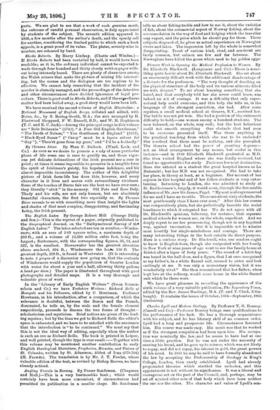Pioneer Work in Opening the Medical Profession to Women. By
Dr. Elizabeth Blackwell. (Longnians and Co.)—There is some- thing quite heroic about Dr. Elizabeth Blackwell. She set about an enormously difficult work with the additional disadvantage of a distaste for the profession. "The very thought of dwelling on the physical structure of the body and its various ailments filled me with disgust." To set about learning something that she hated, and that everybody told her she never could learn, was indeed an act of courage. It was a difficulty that only super- natural help could overcome, and this help, she tells us, in the language of the strongest conviction, she had. After some repulses, a small medical school at Geneva, N.Y., received her. The battle was not yet won. She had a position of the extremest difficulty to hold,—one woman among a hundred students. The men behaved, on the whole, very well ; but the best behaviour could not smooth everything One obstacle that had soon to be overcome presented itself. Was there anything in the practical teaching from which she was to be excluded ? She resolved that there must be nothing, and she prevailed. The Geneva school had the powor of granting degrees— not an ideal arrangement by any means, but useful in this instance—and in 1849 Elizabeth Blackwell graduated as M.D. She then visited England where she was kindly received, but found no opportunities for study Paris was her next destination. Here she entered as a student the great hospital known as La Maternite. ; but her M.D WRB not recognised. She had to take her place, in theory at least, as a beginner. Her account of her sojourn in this hospital and of her fellow-students is very enter- taining. Returning to London, she was admitted to study at St. Bartholomew's, largely, it would seem, through the favourable influence of Mr., now Sir James, Paget. "My seat is always reserved for me and I have no trouble. There are about sixty students, the most gentlemanly class I have ever seen." After this her course was comparatively plain, but she pathetically laments the social loneliness to which it relegated her We do not agree with all Dr. Blackwell's opinions, believing, for instance, that separate medical schools for women are, on the whole, expedient. And we deeply regret to see her pronouncing, though not in any bigotted way, against vaccination. But it is impossible not to admire most heartily her single-mindedness and courage. There are many interesting things in the book outside its direct purpose. Here is a curious story. Dr Blackwell, who, our readers ought to know is English-born, though she emigrated with her family to New York at nine years of ago went to see the family house at Bristol after a lapse of forty years. "The sound of a latch-key was heard in the hall-door, and a figure, that I at once recognised as my father's, in a white flannel suit, seemed to enter and look smilingly at me It was only a momentary vision, but it was wonderfully vivid." She then remembered that her father, when kept late at the refinery, would come home in the white flannel suit which he there wore,


































 Previous page
Previous page